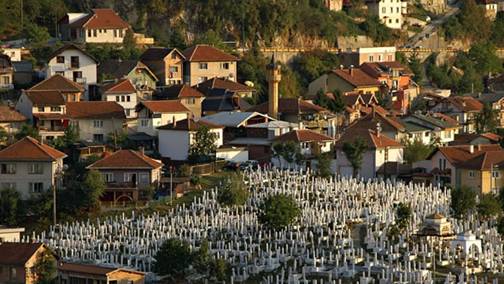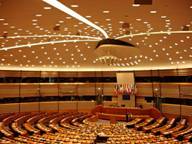Bosnia's visa breakthrough and the power of Europe
Dear friends of ESI,
Today, as the debate on the future and prospects of the international intervention in Afghanistan heats up in NATO capitals, it is striking to recall a period when the situation in the Balkans appeared comparable to that in Central Asia.
 |
|
How things change: Bosnia's professional army as peace-keepers in Afghanistan |
Images and fences
In 1992 Irish writer Conor Cruise O'Brien asserted that
"There are places where a lot of men prefer war, and the looting and raping and domineering that go with it, to any sort of peacetime occupation. One such place is Afghanistan. Another is Yugoslavia, after the collapse of the centralizing Communist regime."
Throughout the 1990s many regarded the Balkans as a region inhabited by people of innate ferocity. In 1993 Peter Galbraith (then US ambassador to Croatia, today deputy head of the UN mission in Kabul) told journalist David Rieff that fighting in Bosnia might go on indefinitely: "Beirut lasted seventeen years." A Belgian paratrooper told Rieff:
"If it were up to me I'd put a fence around this whole damn country and let the last survivor give the UN a call when it was all over."
Of course, recent years have seen Bosnia and the whole Balkan region change in ways that today's state builders in Afghanistan can only dream of. The period since 1999 saw the remarkable (and by now well-documented) return of hundreds of thousands of internally displaced persons of all ethnic groups, including more than 400,000 minority returns. It saw a dramatic improvement in the security situation (see ESI discussion paper The Worst In Class, November 2007). There has been a succession of free and fair elections. There have been peaceful rotations of parties and coalitions in power at all levels of government. There has also been dramatic geopolitical change in the region: Croatia and Albania have joined NATO. Croatia is about to join the European Union.
Milosevic has died. Karadzic stands trial in The Hague. And yet in a recent piece in Foreign Affairs, two US academics assert – without offering any evidence – that Bosnia is today "on the brink of collapse", "may not remain peaceful for long", and that current trends "will almost certainly lead to a resumption of violence." It is an enduring stereotype: a country too dysfunctional, its leaders too venal, its voters too irrational (since they keep on voting for venal leaders) to ever become a normal European state. Therefore, the argument runs, Bosnia cannot be treated in the same manner as other Balkan nations. The Balkans and Bosnia as an irrational universe to be contained or controlled by enlightened imperialism: this image has – until recently – shaped international policy.
Distrust in Bosnians' ability to govern their own country blocks Bosnia from becoming an official EU candidate for accession. And the EU visa fence remains in place for Bosnian citizens even 14 years after the end of the war.
 |
|
Alifakovac Cemetery in Sarajevo. Photo: Alan Grant |
Bosnia's visa breakthrough
It is ironic that at the very moment that the Foreign Affairs article castigates "a misguided effort to let the Bosnians rule themselves" Bosnia's politicians produce a dramatic breakthrough. Those who want to prolong the Bosnian protectorate maintain that "almost every important issue at the central-government level is deadlocked." It is time for a reality check.
A few months ago, in May 2009, Bosnia found itself last among all five Western Balkan countries when it came to meeting the long list of difficult conditions necessary to qualify for visa-free travel to the EU. In response to the Commission's assessment some of Bosnia's friends abroad made the case that it was unfair to hold Bosnia to the same standards as the rest of the region. When the European Commission decided not to offer visa-free travel to Bosnia then others suggested that Bosnia was being discriminated against because of its Muslim population. Some speculated that Bosnian Serbs were blocking visa free travel for Bosnian passport holders.
In fact, Bosnian voters of all ethnic groups very much wanted Bosnia to be on the White Schengen List. So did Bosnian politicians. As Bosnian Prime Minister Nikola Spiric (an ethnic Serb) told ESI a few weeks ago:
"The political situation in Bosnia is difficult. Everybody is only pointing at things that don't work. The assumption is that there cannot be success in BiH… We need a new optimism. Success in visa liberalisation will show that we can have success in other reforms too, including that of the constitution. Therefore my goal, the goal of the Council of Ministers, has been to be successful in visa liberalisation. All efforts in BiH have been put into that. Succeeding will mean that we can also solve all outstanding issues, fulfil reforms deriving from the SAA and the European Partnership. If we fail [in visa liberalisation], we will fail in other areas, too."
ESI, led by Alex Stiglmayer, and Populari, led by Alida Vracic, have spent the period since May researching how Bosnia has performed in relation to each of the outstanding requirements from the roadmap. The result shows phenomenal progress in a short period of time: by now Bosnia has almost caught up with its more successful neighbours (Macedonia, Montenegro and Serbia) to whom the Commission has already proposed visa-free travel! This required a summer of hard work on the part of Bosnia's leaders – and a series of compromises between Bosnia's political parties in the sensitive area of security policy.
The results are remarkable. In May when the Commission issued its assessments of visa progress, many important laws had not yet been adopted: on border control, control of weapons and military equipment, international legal aid in criminal matters and prevention of money laundering and financing of terrorist activities. Two of these laws had been before parliament for over a year. In June, the Bosnian parliament adopted, in urgent procedure, all four laws. The parties also agreed to harmonized entity legislation as regards laws on weapons and on transportation of dangerous matters.
In May this year, Bosnia was planning to introduce the new biometric passport only in January 2010. Since then, Bosnia has accelerated the process. New machine-readable biometric passports will now be available in October 2009; and since 1 July 2009, a new secure system to personalise and distribute passports has been used, which meets the required standards.
In May, data on lost and stolen Bosnian passports was still uploaded into Interpol's database manually and was often incomplete. Since then a new automated system has been put in place to forward this information immediately to Interpol, once a theft or loss is reported.
Before May, coordination among the various agencies stationed at Bosnia's borders lacked formal mechanisms. On 23 September 2009, nine institutions involved in the Integrated Management of Bosnia's Border, from the border police to the phyto-sanitary service, signed an Agreement on Mutual Cooperation, covering matters from data exchange to procurement to joint operations.
In May there was intense inter-entity disagreement on the creation of an independent anti-corruption body. On 24 September 2009, the law establishing the anti-corruption body was adopted by the government and sent to parliament.
As a result of these reforms by the end of 2009, some 65,000 biometric passports will have been issued. Bosnia has formalized cooperation with Eurojust, Europol, Frontex, and with EU member states and neighbouring countries. For years, police work in Bosnia was hampered by inadequate exchange of data, such as of criminal records, fingerprints and registered firearms. Now there is agreement which types of data to exchange. An exchange server connects all police stations to enable instant access to the information.
Bosnia's law enforcement agencies and judicial authorities are making progress in investigating and prosecuting organized crime and corruption. Bosnia has also begun to seriously deal with migration issues. It has modern data protection legislation and a very capable supervisory authority. These are just some of the many reforms that have taken place recently.
This record challenges the image of a dysfunctional country dominated by elites incapable of compromise. It underlines the force of EU soft power, if used in the right way. Recent months have shown that when there is a real incentive and credible conditionality, based on European standards, things can move forward surprisingly quickly. 2009 might yet see a fundamental turning point in Bosnia's history: the end of the international protectorate (and of the mandate of the Office of the High Representative) and the promise to overcome the visa fence that continues to isolate the country.
In May 2009 the European Commission was strict. Now that Bosnia has delivered on its commitment, will European institutions be fair?
 |
 |
|
The European Parliament is debating the report by MEP Tanja Fajon |
|
Strict but fair in the European Parliament
The debate about visa liberalization for the Western Balkans has now, following the proposal from the European Commission, moved to the European Parliament.
There is a strong emerging consensus to accept the Commission proposal to move Macedonia, Serbia and Montenegro to the Schengen White List. The most important unresolved questions concern Bosnia, Albania and Kosovo.
On 1 June 2009 ESI had proposed to move all countries, including Bosnia and Albania, to the "white" Schengen list – "but, in doing so, to stipulate that visa-free travel for Albania and Bosnia will remain pending until all conditions are met. The proposal should also include a specific date for a new assessment to be conducted by the Commission and EU national experts in early 2010."
This approach would fully maintain conditionality – no visa-free travel without fulfilment of the criteria -, but acknowledge Bosnia's achievement. It would also send a strong political signal by shortening the lengthy EU decision-making process, which otherwise requires a new Commission proposal, a new Parliament opinion and a new vote by EU member states.
We are happy to see that the European Parliament's rapporteur, Tanja Fajon makes the same proposal. She suggests that "the former Yugoslav Republic of Macedonia, Montenegro and Serbia … and Albania and Bosnia and Herzegovina … should be transferred" to the Schengen White List. She also notes:
"as regards Albania and Bosnia and Herzegovina, the exemption from the visa requirement should apply without delay immediately after the assessment by the Commission that each of those countries meets all the benchmarks set in the roadmap for visa liberalisation and a notice about the assessment is published in the Official Journal."
In fact, given Bosnia's recent breakthrough, this should open the way for the Commission to assess immediately if Bosnia now meets all the benchmarks. ESI's analysis shows that it does! If the Commission comes to the same conclusion, Bosnia should be included in the current Commission proposal, which EU member states will not vote on before 30 November/1 December.
This is not a political issue. It is a technical one. Bosnia does not need pity based on its recent history. It needs fairness and objectivity based on its current performance. Fairness implies that if both Serbia and Montenegro – with a worse performance record in May 2009 than Bosnia has today – were promised visa free travel at the time then Bosnia should be treated in the same way today.
Albania, Kosovo and conditionality
Due to the June elections, Albania has not (yet) achieved the same recent progress as Bosnia. The Albanian government adopted a new action plan on 29 July 2009, with ambitious but still realistic deadlines to meet the remaining conditions. The new government pledged on 16 September to achieve "free movement of Albanians in the Schengen area within the first year of the government mandate". For Albania, ESI's und the European Parliament's rapporteur's demand to include it in the Commission proposal with visa-free travel suspended until all conditions are met still stands. ESI and its partner organization (the European Movement in Albania) are currently assessing in detail the state of implementation.
Concerning Kosovo the rapporteur Tanja Fajon also proposes that
"the Commission, [within the limits of its competence] should start a visa liberalisation dialogue with Kosovo and establish a roadmap for visa liberalisation similar to the roadmaps established with other Western Balkan countries. This is without prejudice to the status of Kosovo."
ESI believes it is vital that the European Parliament and EU member states follow this recommendation. Again, this would not be a gift to Kosovo. It would apply the same strict conditionality as elsewhere in the region, without being prejudicial of Kosovo's status.
It would reinforce the EU’s Rule of Law mission in Kosovo. This is the largest such mission in the EU's history. It has seen serious challenges to its legitimacy in recent months. Demonstrating that the EU extends "strict but fair" conditionality to Kosovo would send a strong response to those in Kosovo who increasingly regard the EU mission as a quasi-colonial structure meant to control, rather than help, Kosovo’s Europeanisation. It would strengthen all those in Pristina, including senior officials in the Interior Ministry, who have argued for following EU standards with the same energy as other Western Balkan countries.
Kosovo has already unilaterally adopted "its" unofficial EU roadmap and sent it to the Commission Delegation. Any efforts made to strengthen the capacity of Kosovo institutions to fight organised crime and illegal migration will benefit its neighbours and the EU as a whole. Member states who oppose a roadmap for Kosovo, on the other hand, make the job of the EU mission in Kosovo significantly more difficult. It is hard to see any argument why the EU would refuse to deploy one of its most powerful tools to encourage reforms in the field of rule of law - reforms that are in the interest of its own citizens - and risk a serious crisis of confidence instead.
The evidence from recent months is clear: far from being exhausted, the EU's soft power and conditionality remains a powerful tool to bring about far-reaching changes that are in the interests of citizens across Europe. It remains true, as Mark Leonard once put it, that "Europe doesn't change countries by threatening to invade them: its biggest threat is having nothing to do with them at all."
Best regards,

Gerald Knaus
- NEW: Analysis of Bosnia's visa breakthrough
- ESI White List Project
- Rumeli Observer: Is the EU Visa Proposal Anti-Muslim? (18 July)
